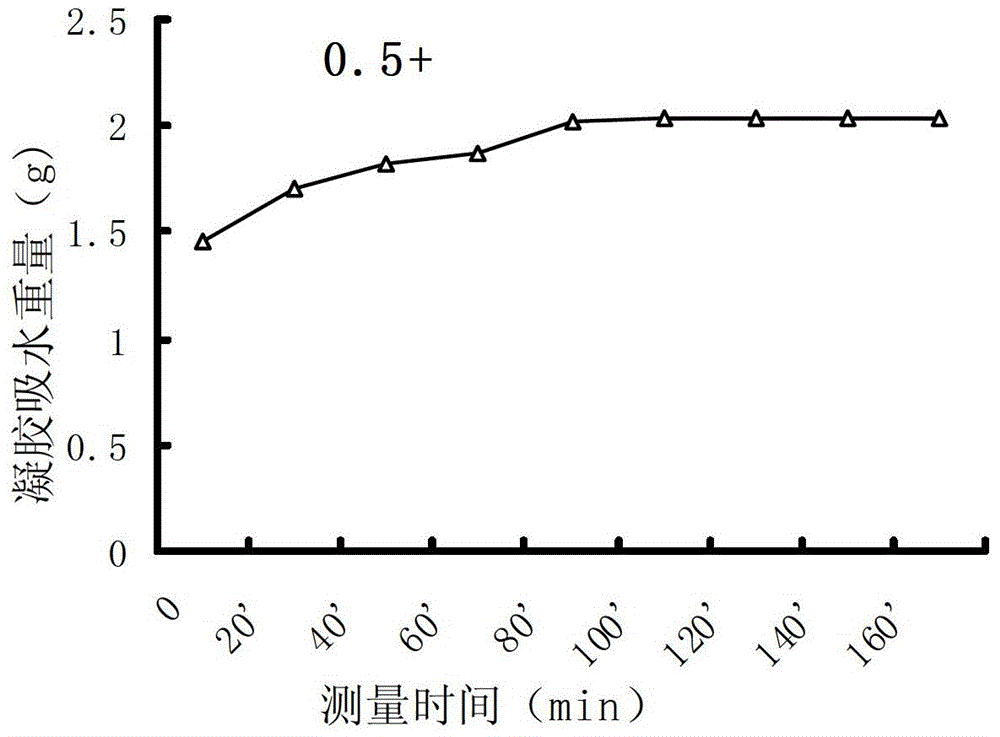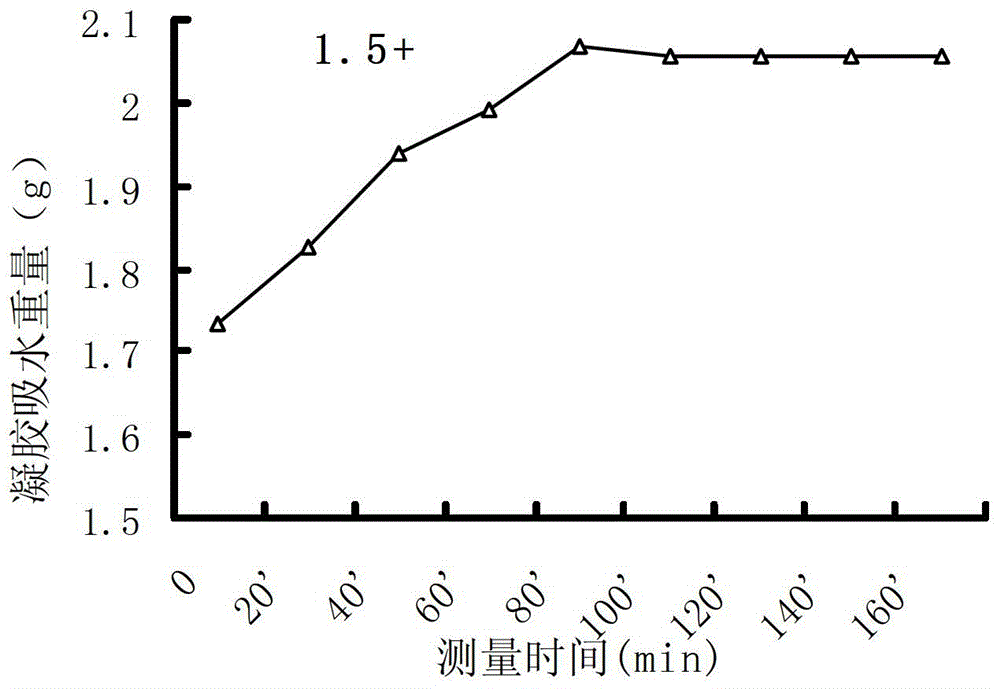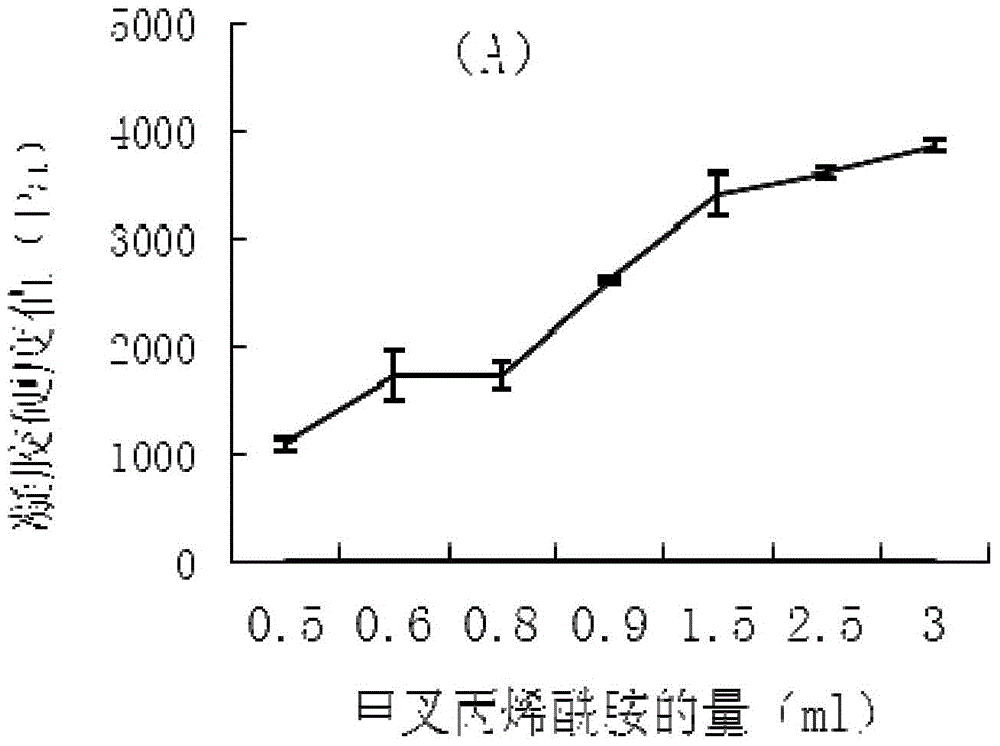Chitosan polyacrylamide hydrogel base material and preparation method thereof
A polyacrylamide, substrate material technology, applied in biochemical equipment and methods, tissue culture, microorganisms, etc., can solve problems such as complex research, multiple influencing factors, and single influence
- Summary
- Abstract
- Description
- Claims
- Application Information
AI Technical Summary
Problems solved by technology
Method used
Image
Examples
Embodiment 1
[0063] A chitosan polyacrylamide hydrogel base material is composed of the following components by volume:
[0064] 30% (w / v) acrylamide solution: 1.25 parts;
[0065] 1% (w / v) Methylenebisacrylamide solution: 0.5 part;
[0066] H 2 O: 3.25 servings;
[0067] 0.03 part of ammonium persulfate solution;
[0068] 0.02 part of tetramethylethylenediamine;
[0069] 0.5 part of 1% (w / v) chitosan solution.
[0070] To prepare 1% (w / v) chitosan solution: add 0.5 g of chitosan to 50 mL of 1% acetic acid solution, stir at 37°C until dissolved, and stand for 24 hours to obtain 1% (w / v) chitosan solution .
[0071] A preparation method of a chitosan polyacrylamide hydrogel base material, comprising the following steps:
[0072] (1) Mixing and stirring: add 30% (w / v) acrylamide solution, 1% (w / v) methylene bisacrylamide solution, ammonium persulfate solution, tetramethylethylenediamine, 1 The % (w / v) chitosan solution is mixed evenly, then added to a centrifuge tube and stirred on a...
Embodiment 2
[0076] A chitosan polyacrylamide hydrogel base material is composed of the following components by volume:
[0077] 30% (w / v) acrylamide solution: 1.25 parts;
[0078] 1% (w / v) Methylenebisacrylamide solution: 3 parts;
[0079] H 2 O: 0.75 parts;
[0080] 0.03 part of ammonium persulfate solution;
[0081] 0.02 part of tetramethylethylenediamine;
[0082] 0.5 part of 1% (w / v) chitosan solution.
[0083] To prepare 1% (w / v) chitosan solution: add 0.5 g of chitosan to 50 mL of 1% acetic acid solution, stir at 37°C until dissolved, and stand for 24 hours to obtain 1% (w / v) chitosan solution .
[0084] A preparation method of a chitosan polyacrylamide hydrogel base material, comprising the following steps:
[0085] (1) Mixing and stirring: add 30% (w / v) acrylamide solution, 1% (w / v) methylene bisacrylamide solution, ammonium persulfate solution, tetramethylethylenediamine, 1 The % (w / v) chitosan solution is mixed evenly, then added to a centrifuge tube and stirred on a vor...
Embodiment 3
[0089] A chitosan polyacrylamide hydrogel base material is composed of the following components by volume:
[0090] 30% (w / v) acrylamide solution: 1.25 parts;
[0091] 1% (w / v) Methylenebisacrylamide solution: 1.5 parts;
[0092] H 2 O: 2.25 servings;
[0093] 0.03 part of ammonium persulfate solution;
[0094] 0.02 part of tetramethylethylenediamine;
[0095] 0.5 part of 1% (w / v) chitosan solution.
[0096] To prepare 1% (w / v) chitosan solution: add 0.5 g of chitosan to 50 mL of 1% acetic acid solution, stir at 37°C until dissolved, and stand for 24 hours to obtain 1% (w / v) chitosan solution .
[0097]A preparation method of a chitosan polyacrylamide hydrogel base material, comprising the following steps:
[0098] (1) Mixing and stirring: add 30% (w / v) acrylamide solution, 1% (w / v) methylene bisacrylamide solution, ammonium persulfate solution, tetramethylethylenediamine, 1 The % (w / v) chitosan solution is mixed evenly, then added to a centrifuge tube and stirred on a...
PUM
| Property | Measurement | Unit |
|---|---|---|
| hardness | aaaaa | aaaaa |
Abstract
Description
Claims
Application Information
 Login to View More
Login to View More - R&D
- Intellectual Property
- Life Sciences
- Materials
- Tech Scout
- Unparalleled Data Quality
- Higher Quality Content
- 60% Fewer Hallucinations
Browse by: Latest US Patents, China's latest patents, Technical Efficacy Thesaurus, Application Domain, Technology Topic, Popular Technical Reports.
© 2025 PatSnap. All rights reserved.Legal|Privacy policy|Modern Slavery Act Transparency Statement|Sitemap|About US| Contact US: help@patsnap.com



